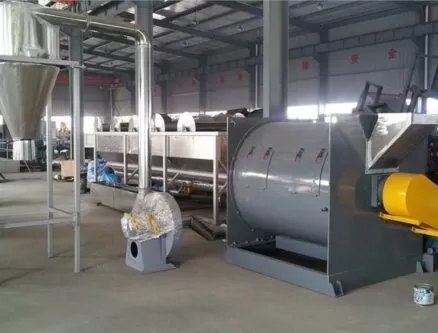Plastic pollution is an escalating problem. Streets lined with plastic bags, rivers choked with plastic waste—it’s a challenge to the environment and a burden on society. As a manufacturer of industrial equipment, I often ask myself: How can we use our expertise to alleviate this issue while fulfilling our corporate social responsibility (CSR)?

The answer is clear: promote plastic recycling and enable circular economies. By combining technological innovation with responsibility, we can reduce waste and contribute to environmental conservation. Plastic recycling and corporate social responsibility aren’t just buzzwords; they are our commitment to a sustainable future.
As the CEO of Amige, I’ve seen how our shredders and crushers transform plastic waste into reusable resources. Today, I’ll share insights into how plastic recycling intersects with CSR and why it matters to businesses.
Why is Plastic Recycling Crucial for Businesses?
Plastic is a cornerstone of modern industry. Lightweight, durable, and cost-effective, it’s indispensable—but also a major pollutant. Every day, millions of tons of plastic waste are generated globally, and less than 10% is recycled. In developing countries, this percentage is even lower. Studies confirm that the majority ends up in landfills or the environment.
By engaging in plastic recycling, businesses can reduce dependence on virgin resources and lower production costs. Industrial equipment, like our shredders, efficiently converts waste plastic into reusable raw materials. This is not only environmentally friendly but also economically viable.
How Can Businesses Fulfill Their Corporate Social Responsibility?
CSR isn’t just about donations or tree planting. It’s about embedding responsibility into your operations. For us, it means producing machines that genuinely drive the recycling economy. By providing efficient and energy-saving plastic shredders, we help our clients minimize waste and improve their environmental impact.
Moreover, businesses that embrace transparency in their recycling initiatives earn customer trust. Consumers prefer brands that care about sustainability, and this trust enhances brand loyalty. Research shows that socially responsible companies often enjoy better long-term profitability.
How Does Plastic Recycling Enhance Corporate Image?
Let’s face it—most customers don’t fully grasp the intricacies of plastic recycling. However, they quickly notice if a company cares about the environment. By adopting recycled materials or highlighting green initiatives, companies can significantly boost their public image.
For instance, some apparel brands attract eco-conscious consumers by creating products from recycled plastics. Similarly, industrial businesses can use recycling equipment to demonstrate their commitment to sustainability. Reports suggest that eco-friendly actions are increasingly influencing customer purchasing decisions.
What Technical Challenges Does Plastic Recycling Face?
Plastic recycling sounds great in theory, but it comes with significant technical challenges. For one, different types of plastics require separate processing. Mixing incompatible plastics can compromise recycling efficiency.
At Amige, we’ve addressed this by designing shredders capable of handling diverse plastic types. Additionally, the quality of recycled plastic often falls short of virgin materials, requiring careful optimization of downstream processes. By providing not just equipment but also tailored solutions, we help clients overcome these hurdles.
How Can Businesses Promote a Circular Economy?
The core of a circular economy is resource reuse rather than single-use consumption. Businesses can achieve this by building closed-loop supply chains. For example, investing in recycling equipment allows companies to transform production waste into raw materials for new products.
At Amige, we assist clients in creating these recycling ecosystems. From initial material input to final product output, our machines ensure every step is efficient and environmentally friendly.
What is the Future of Plastic Recycling and CSR?
With advancing technology and stricter regulations, plastic recycling is becoming more efficient, and businesses are being held to higher CSR standards. In the future, we can expect more intelligent recycling systems and standardized practices across industries.
As an industry practitioner, I believe the fusion of environmental responsibility and business goals is the path forward. This is why we continuously improve our machines—not just to meet market needs, but to drive sustainable progress.
Conclusion
Plastic recycling is more than just an environmental effort; it’s a reflection of corporate responsibility. By fostering circular economies, businesses can conserve resources, enhance their reputation, and create tangible value for society.
For me, this isn’t just a business choice—it’s a mission. If you’re ready to embrace the circular economy, our equipment can help you make it happen. Let’s work together to turn waste into opportunity.
